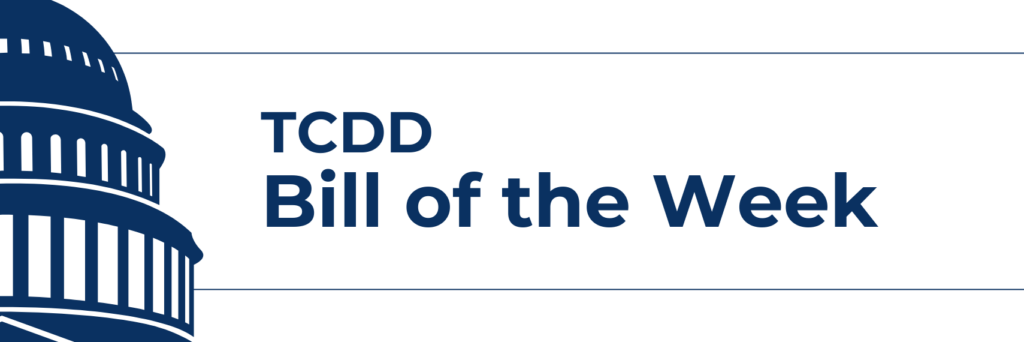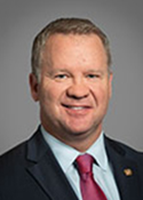
Table of Contents
For this weekly feature, the Texas Council for Developmental Disabilities (TCDD) profiles a noteworthy bill going through the legislative process. The bill may relate directly to TCDD’s Public Policy Priorities or another disability-related issue.
Bill of the Week: HB 1936
House Bill (HB) 1936, relating to issuing citations for the unauthorized use of parking designated for people with disabilities. HB 1936 was authored by Rep. David Cook from Mansfield, District 96.
Share This Bill
We’ve created a Bill of the Week one-pager (PDF) for HB 1936. This is a simplified explanation of the bill that you can share with your representative and personal network.
Background
In 2019, the 86th Texas Legislature passed HB 3163, which updated the standards of accessible parking spaces by requiring both the international symbol of access and the words “no parking” to be painted on any access aisle next to a parking space. While the Texas Commission of Licensing and Regulation (TCLR) adopted these requirements, it only inspects newly constructed parking areas for compliance. Many clearly marked accessible parking spaces still follow the previous guidelines and are waiting to be updated. Because these parking spaces do not meet current standards, some local enforcement officials and judges have declined to issue tickets and citations, worsening the shortage of accessible parking.
In 2023, the 88th Legislature approved Senate Bill (SB) 904 to resolve the issue. However, before it was passed, the bill was amended to state that peace officers may issue warnings but may not issue citations for accessible parking violations if the space does not comply with the updated standards and specifications. This essentially left the loophole that SB 904 was meant to address. In some areas of the state, enforcement of violations has dropped substantially.
What does the bill do?
HB 1936 would amend the Transportation Code. The bill would repeal a single sentence that prevents peace officers from issuing citations for accessible parking violations in parking spaces that are not updated to the newest TCLR standards and specifications.
If passed, HB 1936 would take effect on Sept. 1, 2025, and would apply only to offenses committed on or after that date.

“Texans with disabilities rely on designated parking spaces for safe and equal access, and those spaces must be protected. House Bill 1936 restores law enforcement’s ability to take immediate action to issue citations when accessible parking violations occur.”
Rep. David Cook, HB 1936 author
Where is the bill in the process?
The bill received a public hearing before the House Committee on Transportation on March 27, 2025, and was left pending. When a bill is left pending, it means that the committee did not vote on the bill and it could be considered again at a future committee meeting. You can watch the discussion here, at the 0:10:22 mark.
Who supports the bill and why?
The following comments were registered for a March 27 hearing on HB 1936:
- CTD: Chase Bearden, executive director of the Coalition of Texans with Disabilities (CTD), submitted online comments voicing the group’s support of HB 1936. Bearden emphasized that by passing the bill, the Legislature would be “streamlining the legal framework and reinforcing our commitment to accessibility and fairness.” He further stated that the bill would be “sending a clear message that our state takes the rights of individuals with disabilities seriously and that misuse of designated parking areas will not be tolerated.”
- Advocate: Erik Newlin, who identified himself as a service-connected disabled veteran and father of a wheelchair user, submitted comments in support of HB 1936. He described how “prior legislation [due] to wording has caused many disabled parking spots to not be enforceable by law enforcement.” He specifically cited the situation in Mansfield, Texas, where “enforcement numbers dropped to near zero effective October 2023.” Newlin highlighted the resulting hardships for those needing accessible parking and called for unanimous support of the bill to restore the intended protections for people with mobility challenges.
The following groups also registered their support for the bill: AARP Texas, Disability Rights Texas, and Texas Parent to Parent.
Who opposes the bill and why?
Kimberly Thomson, who identified herself as a personal care attendant, submitted comments online indicating her opposition to the bill. “Repealing Section 681.011 of the Texas Transportation Code,” she wrote, “will result in confusion and misunderstanding.” (Note: HB 1936 would not repeal the entire section. Instead, the bill would repeal a single subsection of the statute.)
Two additional individuals registered their opposition at the March 27 hearing but did not testify on the nature of their concerns.
Additional Testimony
The following comments were provided on the bill at the March 27 hearing:
- GCPD: Ron Lucey, executive director of the Governor’s Committee on People with Disabilities (GCPD), testified on HB 1936. He highlighted the bill’s attempt to fix the unintended confusion created by last session’s SB 904, which has resulted in at least one police department’s call to stop issuing tickets for accessible parking violations until the matter is resolved. In closing, Lucey emphasized the risk that lax enforcement poses to accessibility for people with disabilities, saying that “our committee has studied accessible parking extensively … we believed that we were making progress on accessible parking until this issue had come up recently.”
Additional Information
GCPD previously issued a comprehensive report (PDF, 1.6 MB, 79 pages) on accessible parking issues in Texas. In the committee’s 2026-2027 Policy Recommendations Report to the 89th Texas Legislature (PDF, 3.3 MB, 38 pages), GCPD included a recommendation to “edit accessible parking language” which reads as follows:
Recommendation: The Legislature should amend Transportation Code § 681.011 by removing section (f-2), which allows a peace officer to issue a warning and not a citation when a person parks in a space specifically designated for persons with disabilities, but the space does not have a disability parking space identification sign.
TCDD Council Members adopted the following Public Policy Priority for the 89th Texas Legislature:
Accessibility: Raise accessibility standards in Texas to promote community inclusion and ensure equal access. Texans with disabilities deserve to live in communities which are accessible to them in all aspects of their lives, including meeting basic needs in places outside of the home and utilizing the various modes of transportation.
How much will the bill cost?
The Legislative Budget Board found that HB 1936 would not impact the state budget in a significant way.
Is there a Senate companion to the bill?
There is no Senate companion to HB 1936.
Stay Informed
For the latest information about where HB 1936 is in the process, follow the bill on the Texas Legislature Online. To receive future legislative updates from TCDD, follow us on Facebook, X, Instagram, and LinkedIn.
Bill of the Week Updates
Here is an update on previous TCDD Bills of the Week for the 89th legislative session.
HB 1041 was favorably passed by the House Committee on Human Services on March 31. It is waiting to be scheduled for consideration by the full Texas House. The bill would prohibit paid caregivers from serving as beneficiaries of life insurance policies for individuals under their care.
HB 1188, which would require school districts to refer students with IDD to their local IDD authority, received an April 8 hearing and was favorably passed by the House Committee on Public Education. It is waiting to be scheduled for consideration by the House.
HB 2081 has been scheduled for a hearing on April 15 by the House Committee on Higher Education. The bill would establish the Building Better Futures Program for students with IDD.
SB 568 was passed by the Senate on April 7. The bill, which would restructure funding for special education programs in public schools, now awaits referral to committee in the House.
